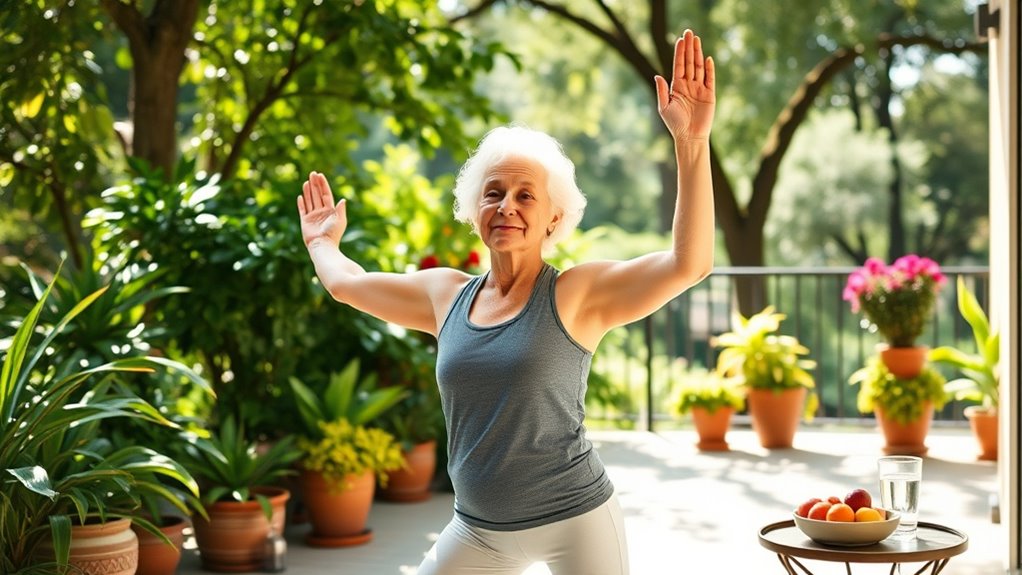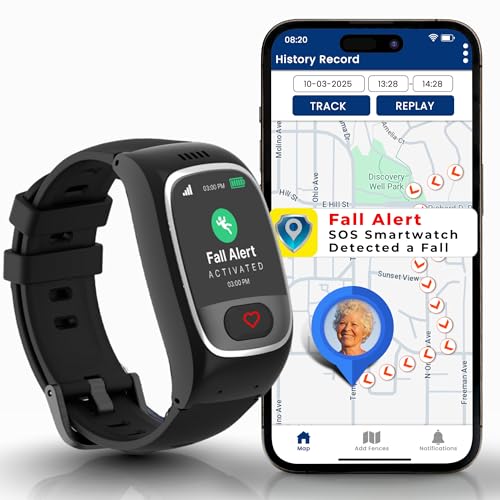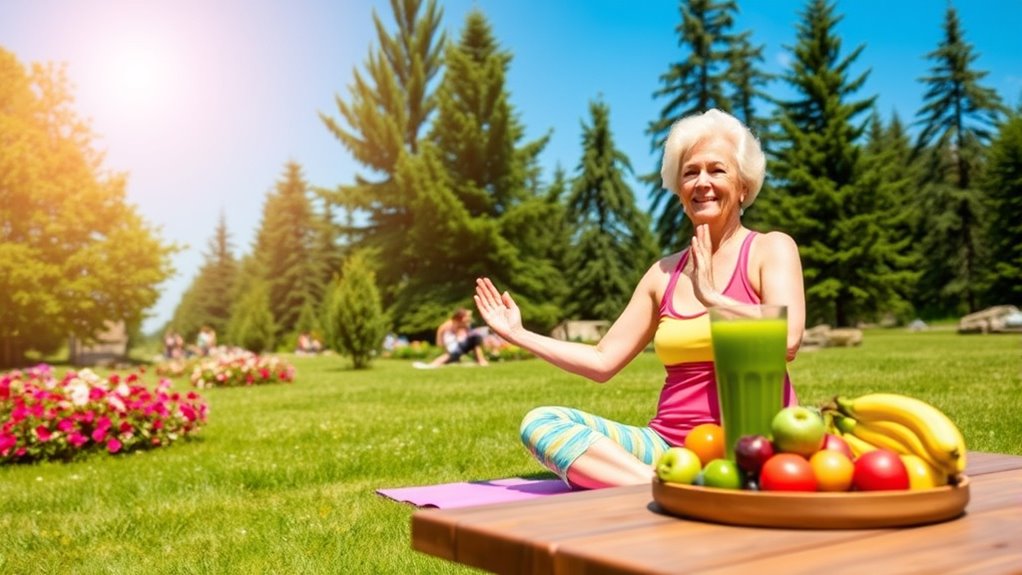To create a healthy aging routine, stay active with at least 150 minutes of moderate exercise weekly, including strength and balance activities. Eat a balanced diet rich in fruits, vegetables, lean proteins, and healthy fats, while staying hydrated. Engage socially and challenge your mind with puzzles or new skills to boost mental health. Use technology like fitness trackers and telehealth services to support your goals. Keep up with regular health check-ups and safety measures—your better aging journey starts here.
Key Takeaways
- Incorporate regular physical activity like walking, swimming, or yoga to enhance strength, balance, and cardiovascular health.
- Follow a balanced diet rich in fruits, vegetables, whole grains, and healthy fats, while staying hydrated.
- Engage in mentally stimulating activities and maintain social connections to support cognitive and emotional well-being.
- Utilize technology tools for health monitoring, medication management, and staying connected to healthcare providers.
- Prioritize preventive care with regular check-ups, vaccinations, stress management, and creating a safe, sleep-friendly environment.

Creating a healthy aging routine is essential for maintaining your independence, vitality, and overall well-being as you grow older. One of the most effective ways to do this is by integrating technology into your daily life. Today’s devices and apps can help you track your physical activity, monitor your health, and stay connected with loved ones. For example, fitness trackers can remind you to exercise, while telehealth services allow you to consult with healthcare providers from the comfort of your home. Using these tools can motivate you to stay active and ensure you’re managing your health proactively. Additionally, technology can assist with financial planning, which is crucial in aging gracefully. Setting up online retirement accounts, budgeting apps, and digital reminders for bills can help you stay on top of your finances. Proper financial planning offers peace of mind, reduces stress, and ensures you’re prepared for unexpected expenses. It’s wise to work with a financial advisor or use reputable online tools to create a sustainable plan that aligns with your lifestyle and health needs. Incorporating digital health management tools can also help you keep track of medication schedules and health metrics, further supporting your wellness routine.
Incorporate technology for health, finance, and connection to support graceful aging and independence.
Physical activity remains a cornerstone of a healthy aging routine. Aim for at least 150 minutes of moderate exercise weekly, such as walking, swimming, or cycling. Incorporate muscle-strengthening activities to preserve muscle mass and bone density, which lowers fall risk. Balance-enhancing practices like Tai Chi or yoga can also improve flexibility and prevent accidents. Remember, it’s important to adapt your routines under healthcare guidance, especially if you have existing health conditions. Exercise not only supports your physical health but also boosts cognitive function, helping you manage depression and anxiety more effectively.
Nutrition and hydration are equally vital. Focus on a balanced diet rich in whole grains, fruits, vegetables, and lean proteins. Embracing Mediterranean-style eating patterns, including healthy fats like olive oil, benefits both your heart and brain. Managing blood sugar through proper food choices can help control diabetes, while staying well-hydrated reduces dehydration risks common in older adults. Avoid excess alcohol and quitting smoking further lowers your chances of developing chronic illnesses. Proper hydration is essential, as dehydration can impair cognitive and physical functions in older adults.
Cognitive health is essential too. Engage in mentally stimulating activities such as puzzles, reading, or learning new skills regularly. Maintaining social connections and participating in group activities combat loneliness and support mental well-being. Practicing stress reduction techniques like meditation or deep breathing can help manage emotional health, while quality sleep underpins both your mental and physical resilience. Scheduling regular check-ups, staying updated on vaccinations, and monitoring sensory functions like vision are preventive steps that safeguard your health. Creating a sleep-friendly environment and managing stress through relaxation techniques round out your routine, helping you age with vitality and independence.

Pedometer Watch Senior Friendly No App/Phone Required, Waterproof Fitness Tracker Watch with Step Counter Calories/Sleep Tracker for Walking Running for Men Women
【𝐍𝐨 𝐀𝐏𝐏 & 𝐏𝐡𝐨𝐧𝐞 𝐑𝐞𝐪𝐮𝐢𝐫𝐞𝐝 𝐏𝐞𝐝𝐨𝐦𝐞𝐭𝐞𝐫 𝐖𝐚𝐭𝐜𝐡】This pedometer watch doesn't require any App or smartphone connections! It's as…
As an affiliate, we earn on qualifying purchases.
As an affiliate, we earn on qualifying purchases.
Frequently Asked Questions
How Can Seniors Stay Motivated to Maintain Their Routine?
You can stay motivated by using motivational strategies like celebrating small wins and recognizing your progress. Set realistic, achievable goals that match your interests and strengths, and break them into manageable steps. Keep track of your achievements, and reward yourself for reaching milestones. Regularly reviewing and adjusting your goals helps maintain your enthusiasm and commitment, making it easier to stay consistent and motivated in your routine.
What Are the Best Hobbies for Cognitive Health?
You can boost your cognitive health by diving into brain-boosting games like crossword puzzles and strategy games, which challenge your mind. Meanwhile, engaging in creative arts like drawing, painting, or playing a musical instrument stimulates your brain visually and emotionally. These hobbies not only sharpen your memory and problem-solving skills but also bring joy and relaxation, making it easier to stay motivated and enjoy your journey to better cognitive health.
How to Adapt Routines for Mobility Limitations?
To adapt routines for mobility limitations, incorporate chair exercises and adaptive yoga to suit your needs. Use a sturdy chair for balance during seated stretches and strength moves, and try adaptive yoga poses that focus on flexibility and relaxation while seated or using support. Always listen to your body, start slow, and consult a professional to guarantee safety. These modifications help maintain mobility, boost confidence, and prevent falls.
What Role Does Mental Health Play in Aging Well?
Mental health plays a vital role in aging well by supporting your mental well-being and fostering emotional resilience. When you prioritize mental health, you can better manage stress, stay socially connected, and maintain a positive outlook. This resilience helps you adapt to physical and cognitive changes, enhancing your overall quality of life. Addressing mental health proactively guarantees you enjoy a healthier, more fulfilling aging experience, even amidst life’s inevitable shifts.
How Can Technology Support a Healthy Aging Routine?
Technology can be your ultimate health ally, transforming your daily routine into a powerhouse of well-being. Wearable devices track essential signs, activity, and sleep, giving you real-time insights to stay on top of your health. Virtual communities connect you with others, reducing loneliness and boosting motivation. Together, these tools empower you to manage your health proactively, making aging well feel like an exciting adventure rather than a challenge.

Seculife Smartwatch: Medical Alert Bracelet with GPS Tracker, Fall Detection Smart Watch, 2 Way Calling, SOS Button, Medical Watch, Emergency Device for Seniors, Life Alert System, Elderly Monitoring
🆘 𝐅𝐚𝐥𝐥 𝐃𝐞𝐭𝐞𝐜𝐭𝐢𝐨𝐧, 𝐒𝐎𝐒 𝐯𝐨𝐢𝐜𝐞 𝐜𝐚𝐥𝐥𝐬 𝐟𝐨𝐫 𝐒𝐞𝐧𝐢𝐨𝐫𝐬: When the smartwatch detects a fall or the heart button…
As an affiliate, we earn on qualifying purchases.
As an affiliate, we earn on qualifying purchases.
Conclusion
By adopting these lifestyle tips, you can enjoy aging gracefully and maintain your vibrancy. Imagine Jane, who started daily walks and improved her diet in her sixties—she now feels more energetic and less frail. Small changes can make a big difference over time. So, take charge today, and build habits that support your health and happiness for years to come. Your future self will thank you for the effort you put in now.

Yoga Mat Non Slip, Eco Friendly Fitness Exercise Mat with Carrying Strap,Pro Yoga Mats for Women,Workout Mats for Home, Pilates and Floor Exercises (Grey Blue/Black, Thickness-6mm)
NEW ECO FRIENDLY MATERIAL: The upgraded Gruper Yoga mat is made with premium friendly material. It costs more…
As an affiliate, we earn on qualifying purchases.
As an affiliate, we earn on qualifying purchases.

The Ultimate Brain Health Puzzle Book for Adults: Crosswords, Sudoku, Cryptograms, Word Searches, and More!
As an affiliate, we earn on qualifying purchases.
As an affiliate, we earn on qualifying purchases.









